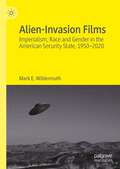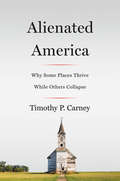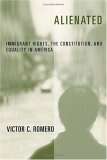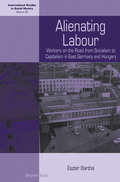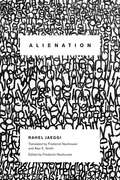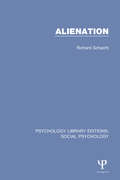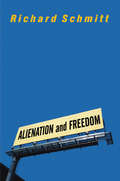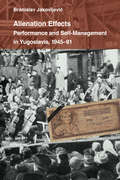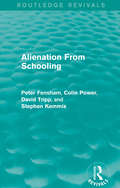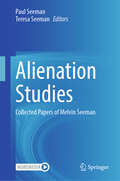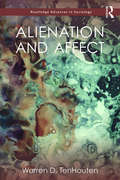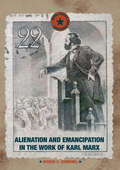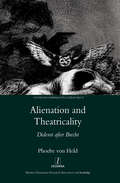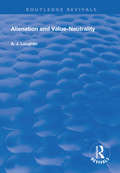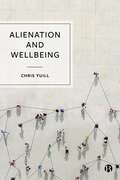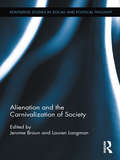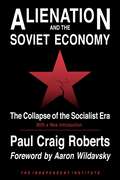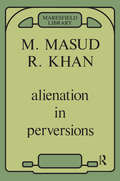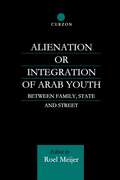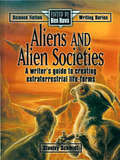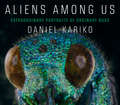- Table View
- List View
Alien-Invasion Films: Imperialism, Race and Gender in the American Security State, 1950-2020
by Mark E. WildermuthThis book studies American science fiction films depicting invasions of the USA and Earth by extra- terrestrials within the context of imperialism from 1950–2020. It shows how such films imagine America and its allies as objects of colonial control. This trope enables filmmakers to explore the ethics of American interventionism abroad either by defending the status quo or by questioning interventionism. The study shows how these films comment on American domestic hegemonic practices regarding racial or gender hierarchies, as well as hegemonic practices abroad. Beginning with the Cold War consensus in the 1950s, the study shows how hegemony at home and abroad promotes division in the culture.
Alienated America: Why Some Places Thrive While Others Collapse
by Timothy P CarneyRespected conservative journalist and commentator Timothy P. Carney continues the conversation begun with Hillbilly Elegy and the classic Bowling Alone in this hard-hitting analysis that identifies the true factor behind the decline of the American dream: it is not purely the result of economics as the left claims, but the collapse of the institutions that made us successful, including marriage, church, and civic life.During the 2016 presidential campaign, Donald J. Trump proclaimed, “the American dream is dead,” and this message resonated across the country. Why do so many people believe that the American dream is no longer within reach? Growing inequality, stubborn pockets of immobility, rising rates of deadly addiction, the increasing and troubling fact that where you start determines where you end up, heightening political strife—these are the disturbing realities threatening ordinary American lives today.The standard accounts pointed to economic problems among the working class, but the root was a cultural collapse: While the educated and wealthy elites still enjoy strong communities, most blue-collar Americans lack strong communities and institutions that bind them to their neighbors. And outside of the elites, the central American institution has been religionThat is, it’s not the factory closings that have torn us apart; it’s the church closings. The dissolution of our most cherished institutions—nuclear families, places of worship, civic organizations—has not only divided us, but eroded our sense of worth, belief in opportunity, and connection to one another.In Abandoned America, Carney visits all corners of America, from the dim country bars of Southwestern Pennsylvania., to the bustling Mormon wards of Salt Lake City, and explains the most important data and research to demonstrate how the social connection is the great divide in America. He shows that Trump’s surprising victory was the most visible symptom of this deep-seated problem. In addition to his detailed exploration of how a range of societal changes have, in tandem, damaged us, Carney provides a framework that will lead us back out of a lonely, modern wilderness.
Alienated Minority: The Jews Of Medieval Latin Europe
by Kenneth R. StowThis narrative history surveying 1000 years of Jewish life, integrated the Jewish experience into the context of the overall culture and society of medieval Europe. It presents a new picture of the interaction between Christians and Jews in this tumultuous era.
Alienated: Immigrant Rights, the Constitution, and Equality in America (Critical America #28)
by Victor C. RomeroThroughout American history, the government has used U.S. citizenship and immigration law to protect privileged groups from less privileged ones, using citizenship as a “legitimate” proxy for otherwise invidious, and often unconstitutional, discrimination on the basis of race. While racial discrimination is rarely legally acceptable today, profiling on the basis of citizenship is still largely unchecked, and has in fact arguably increased in the wake of the September 11 terror attacks on the United States. In this thoughtful examination of the intersection between American immigration and constitutional law, Victor C. Romero draws our attention to a “constitutional immigration law paradox” that reserves certain rights for U.S. citizens only, while simultaneously purporting to treat all people fairly under constitutional law regardless of citizenship.As a naturalized Filipino American, Romero brings an outsider's perspective to Alienated, forcing us to look at constitutional immigration law from the vantage point of people whose citizenship status is murky (either legally or from the viewpoint of other citizens and lawmakers), including foreign-born adoptees, undocumented immigrants, tourists, foreign students, and same-gender bi-national partners. Romero endorses an equality-based reading of the Constitution and advocates a new theoretical and practical approach that protects the individual rights of non-citizens without sacrificing their personhood.
Alienating Labour: Workers on the Road from Socialism to Capitalism in East Germany and Hungary (International Studies in Social History #22)
by Eszter BarthaThe Communist Party dictatorships in Hungary and East Germany sought to win over the “masses” with promises of providing for ever-increasing levels of consumption. This policy—successful at the outset—in the long-term proved to be detrimental for the regimes because it shifted working class political consciousness to the right while it effectively excluded leftist alternatives from the public sphere. This book argues that this policy can provide the key to understanding of the collapse of the regimes. It examines the case studies of two large factories, Carl Zeiss Jena (East Germany) and Rába in Győr (Hungary), and demonstrates how the study of the formation of the relationship between the workers’ state and the industrial working class can offer illuminating insights into the important issue of the legitimacy (and its eventual loss) of Communist regimes.
Alienation
by Frederick Neuhouser Alan E. Smith Rahel JaeggiThe Hegelian-Marxist idea of alienation fell out of favor during the post-metaphysical rejection of humanism and essentialist views of human nature. In this book Jaeggi draws on phenomenological analyses grounded in modern conceptions of agency, along with recent work in the analytical tradition, to reconceive of alienation as the absence of a meaningful relationship to oneself and others, which manifests itself in feelings of helplessness and the despondent acceptance of ossified social roles and expectations.A revived approach to alienation helps critical social theory engage with phenomena, such as meaninglessness, isolation, and indifference, which have broad implications for issues of justice. By severing alienation's link to a problematic conception of human essence while retaining its social-philosophical content, Jaeggi provides resources for a renewed critique of social pathologies, a much-neglected concern in contemporary liberal political philosophy. Her work revisits the arguments of Rousseau, Hegel, Kierkegaard, and Heidegger, placing them in dialogue with Thomas Nagel, Bernard Williams, and Charles Taylor.
Alienation
by Frederick Neuhouser Alan E. Smith Rahel JaeggiThe Hegelian-Marxist idea of alienation fell out of favor during the post-metaphysical rejection of humanism and essentialist views of human nature. In this book Jaeggi draws on phenomenological analyses grounded in modern conceptions of agency, along with recent work in the analytical tradition, to reconceive of alienation as the absence of a meaningful relationship to oneself and others, which manifests itself in feelings of helplessness and the despondent acceptance of ossified social roles and expectations.A revived approach to alienation helps critical social theory engage with phenomena, such as meaninglessness, isolation, and indifference, which have broad implications for issues of justice. By severing alienation's link to a problematic conception of human essence while retaining its social-philosophical content, Jaeggi provides resources for a renewed critique of social pathologies, a much-neglected concern in contemporary liberal political philosophy. Her work revisits the arguments of Rousseau, Hegel, Kierkegaard, and Heidegger, placing them in dialogue with Thomas Nagel, Bernard Williams, and Charles Taylor.
Alienation (New Directions in Critical Theory #4)
by Rahel JaeggiThe Hegelian-Marxist idea of alienation fell out of favor after the postmetaphysical rejection of humanism and essentialist views of human nature. In this book Rahel Jaeggi draws on the Hegelian philosophical tradition, phenomenological analyses grounded in modern conceptions of agency, and recent work in the analytical tradition to reconceive alienation as the absence of a meaningful relationship to oneself and others, which manifests in feelings of helplessness and the despondent acceptance of ossified social roles and expectations.A revived approach to alienation helps critical social theory engage with phenomena such as meaninglessness, isolation, and indifference. By severing alienation's link to a problematic conception of human essence while retaining its social-philosophical content, Jaeggi provides resources for a renewed critique of social pathologies, a much-neglected concern in contemporary liberal political philosophy. Her work revisits the arguments of Rousseau, Hegel, Kierkegaard, and Heidegger, placing them in dialogue with Thomas Nagel, Bernard Williams, and Charles Taylor.
Alienation (Psychology Library Editions: Social Psychology)
by Richard SchachtFirst published in 1970, original blurb: ‘Alienation’ is the catchword of our time. It has been applied to everything from the new politics to the anti-heroes of today’s films. But what does it mean to say that someone is alienated? Is alienation a state of mind, or a relationship? If modern man is indeed alienated, is it from his work, his government, his society, or himself – or from all of these? Richard Schacht, in this intelligent analysis, gets to the root of these questions. Examining the concept of alienation in the works of Hegel and Marx, he gives a clear account of the origins of the modern usage of the term. Among the many insights to be gained from this analysis is a clear understanding of Hegel’s influence on Marx in this most crucial area. Mr Schacht goes on to discuss the concept of alienation in recent philosophical and sociological literature, particularly in the writings of Erich Fromm. Here he finds a great deal of confusion, which has resulted in a series of almost universally unquestioned misconceptions. This, then, is a book for all of us who use – and mis-use – the term ‘alienation’, and who are interested in the concepts it brings to mind. The arguments of Professor Walter Kaufmann’s introductory essay provide a useful background for Mr Schacht’s analysis. In this essay, Professor Kaufmann states that ‘henceforth nobody should write about alienation without first reading Schacht’s book.’
Alienation And Freedom
by Richard SchmittDrawing from existentialism, feminism, the thought of Karl Marx and novelists like Dostoevsky, Richard Schmitt looks at modern capitalist societies to understand what it is that might be wrong for individuals. His concern focuses specifically on those who are alienated-- those persons who have difficulty finding meaning in their lives, who lack confidence in themselves and trust in others and, finally, who are constantly distracted by consumer society. He explores how and why alienation occurs. From friendship, love, and work, Alienation and Freedom touches on issues meaningful to us all.
Alienation Effects: Performance and Self-Management in Yugoslavia, 1945-91
by Branislav JakovljevicIn the 1970s, Yugoslavia emerged as a dynamic environment for conceptual and performance art. At the same time, it pursued its own form of political economy of socialist self-management. Alienation Effects argues that a deep relationship existed between the democratization of the arts and industrial democracy, resulting in a culture difficult to classify. The book challenges the assumption that the art emerging in Eastern Europe before 1989 was either "official" or "dissident" art; and shows thatthe break up of Yugoslavia was not a result of "ancient hatreds" among its peoples but instead came from the distortion and defeat of the idea of self-management. The case studies include mass performances organized during state holidays; proto-performance art, such as the 1954 production of Waiting for Godot in a former concentration camp in Belgrade; student demonstrations in 1968; and body art pieces by Gina Pane, Joseph Beuys, Marina Abramovic, and others. Alienation Effects sheds new light on the work of well-known artists and scholars, including early experimental poetry by Slavoj Ž iž ek, as well as performance and conceptual artists that deserve wider, international attention.
Alienation From Schooling (Routledge Revivals)
by Peter FenshamOriginally published in 1986, this book presents three full case studies of secondary school communities in Australia: one city school in a working-class area, one community school serving a wide, more rural area, and a school with an academic tradition in the suburbs of a large city. The material is drawn together to discuss and describe the issues revealed by the studies: these include discipline, boredom, staff-student relations, and the relevance of school work to the outside world. The book includes interviews with both students and teachers, recording the reactions of students to the way they are being taught, and their views on whether it is worth working hard at school when there is no certainly of a job at the end of it. The philosophy of the teachers emerges in the interviews, as do their views on the prospect of changing students’ attitudes from those acquired at home, and on the need for vocational rather than academic courses. What also comes out in the interviews is their realistic attitudes to their students’ future job prospects, and their views on alternative courses which could prepare the pupils for life rather than for a specific job. The book also includes an account of how the case studies were undertaken and reported. The methodological chapters set out some of the dilemmas and the possibilities in the study of such complex human situations.
Alienation Studies: Collected Papers of Melvin Seeman
by Paul Seeman Teresa SeemanThis book compiles cross-cultural studies on alienation undertaken by the late Dr. Melvin Seeman, including relevant historical and theoretical contexts and analyses related to the ongoing development of the alienation model and its counterparts in the behavioral sciences. Chapters track the development of this model across a half-century of interdisciplinary research, encompassing various research partnerships over the years.
Alienation and Affect (Routledge Advances in Sociology)
by Warren D. TenHoutenAlienation has objective, social-structural determinants, yet is experienced subjectively as a psychological state involving both emotion and cognition. Part I considers conceptualizations of alienation and affect in historical context, emphasizing Rousseau, Hegel, Marx, Simmel, and Weber. Part II develops a theory of the affective bases of Seeman’s original five varieties of alienation – normlessness, meaninglessness, self-estrangement, cultural estrangement, and powerlessness. The book argues that both normlessness and cultural estrangement manifest in two distinct forms and involve distinct emotions. Thus it develops the affective bases of seven distinct varieties of alienation. This work synthesizes classical and contemporary alienation theory and the sociology of emotions. It contributes to political sociology, and finds application in social psychiatry and related health and social-service fields that treat traumatized and highly alienated individuals.
Alienation and Emancipation in the Work of Karl Marx (Marx, Engels, and Marxisms)
by George C. ComninelThis book considers Karl Marx’s ideas in relation to the social and political context in which he lived and wrote. It emphasizes both the continuity of his commitment to the cause of full human emancipation, and the role of his critique of political economy in conceiving history to be the history of class struggles. The book follows his developing ideas from before he encountered political economy, through the politics of 1848 and the Bonapartist “farce,”, the maturation of the critique of political economy in the Grundrisse and Capital, and his engagement with the politics of the First International and the legacy of the Paris Commune. Notwithstanding errors in historical judgment largely reflecting the influence of dominant liberal historiography, Marx laid the foundations for a new social theory premised upon the historical consequences of alienation and the potential for human freedom.
Alienation and Nature in Environmental Philosophy
by Simon HailwoodMany environmental scientists, scholars and activists characterise our situation as one of alienation from nature, but this notion can easily seem meaningless or irrational. In this book, Simon Hailwood critically analyses the idea of alienation from nature and argues that it can be a useful notion when understood pluralistically. He distinguishes different senses of alienation from nature pertaining to different environmental contexts and concerns, and draws upon a range of philosophical and environmental ideas and themes including pragmatism, eco-phenomenology, climate change, ecological justice, Marxism and critical theory. His novel perspective shows that different environmental concerns - both anthropocentric both anthropocentric and nonanthropocentric - can dovetail, rather than compete with, each other, and that our alienation from nature need not be something to be regretted or overcome. His book will interest a broad readership in environmental philosophy and ethics, political philosophy, geography and environmental studies.
Alienation and Theatricality: Diderot After Brecht
by Phoebevon HeldAlienation (Vefremdung) is a concept inextricably linked with the name of twentieth-century German playwright Bertolt Brecht - with modernism, the avant-garde and Marxist theory. However, as Phoebe von Held argues in this book, 'alienation' as a sociological and aesthetic notionavant la lettre had already surfaced in the thought of eighteenth-century French philosopher and writer Denis Diderot. This original study destabilizes the conventional understanding of alienation through a reading ofLe Paradoxe sur le comedien, Le Neveu de Rameau and other works by Diderot, opening up new ways of interpretation and aesthetic practices. If alienation constitutes a historical development for the Marxist Brecht, for Diderot it defines an existential condition. Brecht uses the alienation-effect to undermine a form of naturalism based on subjectivity, identification and illusion; Diderot, by contrast, plunges the spectator into identification and illusion, to produce an aesthetic of theatricality that is profoundly alienating and yet remains anchored in subjectivity.
Alienation and Value-Neutrality (Routledge Revivals)
by A.J LoughlinFirst published in 1998, Loughlin examines the conception of rationality through the gazes of science, philosophy and political philosophy to further explain the concept of rational reasoning, the effects it has on the development on natural and social science and its implications on how we think about morals and politics.
Alienation and Wellbeing
by Chris YuillMarx argued that capitalist society acts against the core capacities, skills and talents of human beings, and that it also limits their realisation or channels them into activities related to profit rather than need. Bringing Marx’s theory of alienation forward to the present day, this book uniquely links it to health and well-being. Using case studies and vignettes of workers across different industries, it reveals their lived experiences, offering crucial insights into the insidious ways in which capitalism continues to damage human well-being. This is a resounding call for how society can change for the better.
Alienation and the Carnivalization of Society (Routledge Studies in Social and Political Thought)
by Jerome Braun Lauren LangmanThis book examines alienation from both a sociological and psychoanalytic perspective, revisiting classic treatments of the topic (Marx, Simmel, Weber) and exploring its relevance to understanding post-modern consumer society. It examines the escapist potentials for good and for ill in modern society - those fostered by commercial interests, and those maintained by individuals and groups as their form of resisting alienation.
Alienation and the Soviet Economy: The Collapse of the Socialist Era
by Paul Craig RobertsIn 1971, Paul Craig Roberts created a firestorm among professional Sovietologists by proclaiming that the economies of the USSR and its East Bloc allies were doomed because their "planned" economies were, in reality, anything but planned.In this revised edition, Paul Craig Roberts examines how reality triumphed over Marxist theory and the implications for the future of Russia and eastern Europe. Expanding on his original ideas, Roberts demonstrates the fatal shortcomings of Marxist economies, ranging from misallocation of resources to ersatz capitalistic concepts grafted onto a system that calls for production without regard to profit. Roberts argues that the economies of the nations emerging from the USSR&’s collapse must grasp the profound truths in this book if they are to become viable.
Alienation in Perversions
by Masud KhanPerversions and borderline states were, by accident of fate, Masud Khan's chief preoccupation in his clinical work during the last three decades of his life. In an earlier volume, The Privacy of the Self, he presented what he called the natural and private crystallization of his experience with his patients and teachers; notably, in the latter category, Anna Freud, John Rickman and D.W. Winnicott. In this later book he takes his cue from Freud who, as he says, diagnosed the sickness of Western Judaeo-Christian cultures in terms of "the person alienated from himself". Masud Khan's basic argument, succinctly stated in his Preface, is that "the pervert puts an impersonal object between his desire and his accomplice. This object can be a stereotype fantasy, a gadget or a pornographic image. All three alienate the pervert from himself, as, alas, from the object of desire".With its wealth of clinical and theoretical insights, Masud Khan's Alienation in Perversions makes a major contribution to our understanding of perversion formation.
Alienation or Integration of Arab Youth: Between Family, State and Street
by Roel MeijerAn anthology of contributions from eleven renowned specialists in the field who deal with topics that effect Arab youth in the Middle East the most, such as demographic growth, rising unemployment, and the difficult prospects of their future. Apart from studies on violence and youth in the Algerian civil war, the book offers new insights into generational conflicts and attempts by contemporary youth to overcome their alienation by creating their own eclectic cultural solutions to the problems of tradition and modernity. The book is based on the latest research and opinion surveys held in different Arab countries.
Aliens & Alien Societies: A Writer's Guide to Creating Extraterrestrial Life-Forms (Science Fiction Writing Ser.)
by Schmidt Stanley"There are more things in heaven and earth, Horatio, than are dreamt of in your philosophy." - Hamlet, William ShakespeareStanley Schmidt guides you toward a better understanding of our universe to create beings who will live in your science fiction.Aliens and Alien Societies explains science to help you make your fiction plausible. You'll avoid bringing characters from solar systems unlikely to support life. Discover the galaxy's vastness and imagine the technology needed to cross it. Put biochemistry on your side to put viable creatures on your pages. Learn how engineering shapes life and why this suggests that intelligent inhabitants of other planets might have similarities to humans. Develop well-founded cultures and logical languages. Introduce aliens to people or other aliens. Portray them as individuals, true to their species.In this book, possibilities abound and lines between knowledge and conjecture blur enthrallingly.Aliens and Alien Societies is thoughtful, clear and utterly fascinating. It is filled with facts to help you write believable fictions about the things in heaven and earth.
Aliens Among Us: Extraordinary Portraits Of Ordinary Bugs
by Daniel KarikoWith more than sixty stunning photographs of pillbugs, silverfish, moths, and other household insects, Aliens Among Us depicts a hidden world flourishing in our homes. Over the course of his photography career, Daniel Kariko came to realize that many of his most stunning subjects could be found in his own subdivision in Greenville, North Carolina. Determined to show the rest of us that his experience is hardly unusual, Kariko utilizes a combination of a Scanning Electron Microscope and optical Stereo Microscope to achieve a portrait-like effect for insects and arthropods. Vibrant in color and surprising in personality, these images reveal such details as the glittering eyes of a horsefly, the strong legs of a centipede, and the fetching smile of a honeybee. Each photograph comes equipped with a full-body illustration from artist Isaac Talley, and fascinating character descriptions from entomologist Tim Christensen. Deftly blurring the lines of art and science, Aliens Among Us is the perfect guidebook for anyone interested in putting a face to the creepers under the couch.
